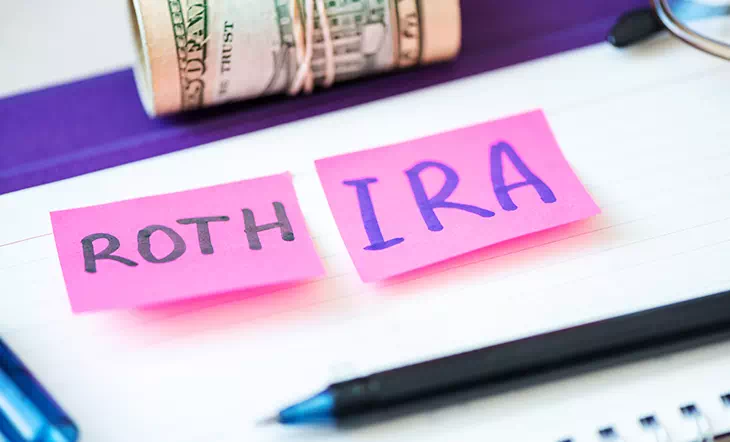What’s So Special About a Roth IRA?

Even though Roth Individual Retirement Accounts (IRAs) have been around since 1998, many investors aren’t aware of all the differences between traditional and Roth IRAs. Thus, they aren’t sure which IRA is the better alternative for them. As a summary, the unique features of a Roth IRA include:
- Single taxpayers with adjusted gross income (AGI) less than $95,000 and married taxpayers filing jointly with AGI less than $150,000 can make contributions to a Roth IRA, regardless of their participation in a qualified retirement plan. Contributions are phased out for married taxpayers filing jointly with AGI between $150,000 and $160,000 and for single taxpayers with AGI between $95,000 and $110,000.
- Since contributions are not tax-deductible, they can be withdrawn at any time, even before you turn 59 1/2 years old, without paying income taxes or the 10% federal tax penalty.
- Contributions can be made as long as you have earned income, no matter how old you are.
- Qualified distributions can be taken free of federal income taxes. A qualified distribution is one made after reaching 59 1/2 and at least five tax years after the first contribution. Distributions can also be taken free of federal income tax due to death, disability, or to pay up to $10,000 of qualified first-time homebuyer expenses.
- There are no mandatory minimum distributions after 70 1/2. You can take out as much or as little as you want after 59 1/2, but you can allow the balance to grow on a tax-free basis if you don’t need the money.
- Qualified distributions from Roth IRAs are not included in AGI, so they don’t affect whether Social Security benefits are subject to income taxes.
- Roth IRAs can provide a tax-advantaged way to bequeath assets to heirs. Both traditional and Roth IRAs may be subject to estate taxes, depending on your estate’s total value and who your beneficiary is. However, the beneficiaries of traditional IRAs must pay income taxes on distributions, while Roth IRA beneficiaries receive qualified amounts free of federal income taxes.
So, based on all these unique features, which is a better alternative for you – a traditional deductible or a Roth IRA? Look at these factors before deciding:
- Consider your current marginal income tax bracket and your expected bracket when the funds will be withdrawn. If your marginal tax bracket will be the same, either IRA will produce a similar result. Declining marginal tax rates may make a deductible IRA a better alternative, while increasing marginal rates may make the Roth IRA a better alternative.
- If you make the maximum IRA contribution to a Roth IRA, you will have a larger after-tax balance than making maximum contributions to a deductible IRA. This occurs because you are essentially funding the tax bill with funds outside the Roth IRA. To offset the Roth IRA’s advantage, you would also have to invest the tax savings from your traditional IRA contribution.
- Don’t forget the Roth IRA’s other advantages. If you don’t think you’ll need to make withdrawals after 70 1/2, the Roth IRA can continue to grow on a tax-free basis. Or, if you think you’ll need your contributions before 59 1/2, you can withdraw Roth IRA contributions at any time with no tax consequences.
For additional information on retirement planning strategies that can be tailored to your specific financial needs and goals, visit Dash Investments or email me directly at dash@dashinvestments.com.
About Dash Investments
Dash Investments is privately owned by Jonathan Dash and is an independent investment advisory firm, managing private client accounts for individuals and families across America. As a Registered Investment Advisor (RIA) firm with the SEC, they are fiduciaries who put clients’ interests ahead of everything else.
Dash Investments offers a full range of investment advisory and financial services, which are tailored to each client’s unique needs providing institutional-caliber money management services that are based upon a solid, proven research approach. Additionally, each client receives comprehensive financial planning to ensure they are moving toward their financial goals.
CEO & Chief Investment Officer Jonathan Dash has been profiled by The Wall Street Journal, Barron’s, and CNBC as a leader in the investment industry with a track record of creating value for his firm’s clients.

Jonathan Dash is the Founder of Dash Investments. As Chief Investment Officer, he is responsible for all the investment management and asset allocation decisions at the firm. With over 25 years of experience in investment management, Mr. Dash has an established reputation as a superior money manager. Dash Investments has been covered in major business publications such as Barron’s, The Wall Street Journal, and The New York Times. Mr. Dash graduated from the University of Southern California with a B.S. in Finance and has also completed numerous executive programs at both Harvard Business School and Columbia Business School covering corporate restructuring, mergers and acquisitions, financial analysis and valuation. Jonathan Dash 800-549-3227
Related Article
9 min read
17 Sep 2025
How to craft the perfect financial plan for short, medium and long term goals
Financial planning is not a singular decision; it’s a series of well-timed, interconnected moves. Each move serves a different purpose, yet all must align with one overarching objective: securing your future on your terms. Short, medium, and long-term financial goals are the scaffolding for that future. They dictate how you allocate resources, manage risk, and […]
12 min read
05 Aug 2025
Deciding What to Do with Your 401(k) Plan When You Change Jobs
Changing jobs is often a moment of optimism and renewed purpose. New responsibilities. Better compensation. Maybe even a new city. But amid the excitement of offer letters and onboarding checklists, there’s one often-overlooked question that can quietly shape your retirement future: What happens to your 401(k) when you change jobs? You’ve spent years contributing, watching […]
11 min read
22 Jul 2025
How to Rollover your 401(k) in 5 Easy Steps
Are you thinking about rolling over your 401(k)? People usually arrive at this conclusion if they have changed jobs or just want better control over their retirement funds. A 401(k) rollover refers to transferring money from one retirement account, such as an old employer’s 401(k), into a new 401(k) or an Individual Retirement Account (IRA). […]
10 min read
08 Jul 2025
Things to Know If You Are Planning an Early Withdrawal from Your Roth IRA
Are you thinking about cashing in on your Roth Individual Retirement Account (IRA) early? Before you make the move, it is important to understand what you are really signing up for and how this one decision affects multiple things. First off, let’s clear up some confusion. There are several types of IRAs, such as Traditional, […]
More From Author
13 min read
30 Sep 2021
Questions To Ask Your Financial Advisor About Retirement
Retirement is the golden period of your life, provided you save well for it. If you have sufficient retirement savings, you can spend your non-working years traveling, enjoying life, spending time with your family, and doing anything else you like. However, if your retirement savings are below the required limit (average Americans feel they require […]
11 min read
14 Jul 2021
A Retirement Planning Guide for High-Net-Worth Individuals
Planning for retirement is an important component of everyone’s financial planning, including that of a high-net-worth individual (HNWI). Table of ContentsWhat is a high net worth individual (HNWI)?What is a ultra high net worth individual (UHNWI)?1. Understand your unique financial needs:2. Plan to make your money last longer:3. Manage your investments and risk:4. Minimize your […]
10 min read
25 Jul 2022
Financial Planning for High-Net-Worth Individuals
Financial planning can be helpful in many ways. It can help you save more, invest smartly, and find ways to increase your income sources. It is an integral part of any individual’s life, irrespective of factors like income, age, profession, etc. Financial planning adds discipline to your routine. It gives your goals a direction and […]
13 min read
25 Oct 2021
8 Retirement Savings Tips for 55-64 Year-Olds
The years before your retirement can be rather crucial. Regardless of when you decide to settle into retirement, the time left to retire significantly narrows down when you reach 55. Considering the fact that most people retire by 65, you have only 10 years to save for your retirement at 55. If you are older, […]
Find & Compare Top Financial
Advisors in your area
Get Started
Popular Posts
Categories
- Business Finance (2)
- Education Planning (31)
- Estate Planning (31)
- Financial Advisor (1)
- Financial Advisor Guide (55)
- Financial Planning (138)
- Investment Management (99)
- Personal Finance (15)
- Portfolio Management (1)
- Retirement (30)
- Retirement Healthcare (1)
- Retirement Planning (109)
- Retirement Plans (1)
- Uncategorized (4)
Subscribe to our
newsletter & get helpful
financial tips.
The blog articles on this website are provided for general educational and informational purposes only, and no content included is intended to be used as financial or legal advice. A professional financial advisor should be consulted prior to making any investment decisions. Each person’s financial situation is unique, and your advisor would be able to provide you with the financial information and advice related to your financial situation.



